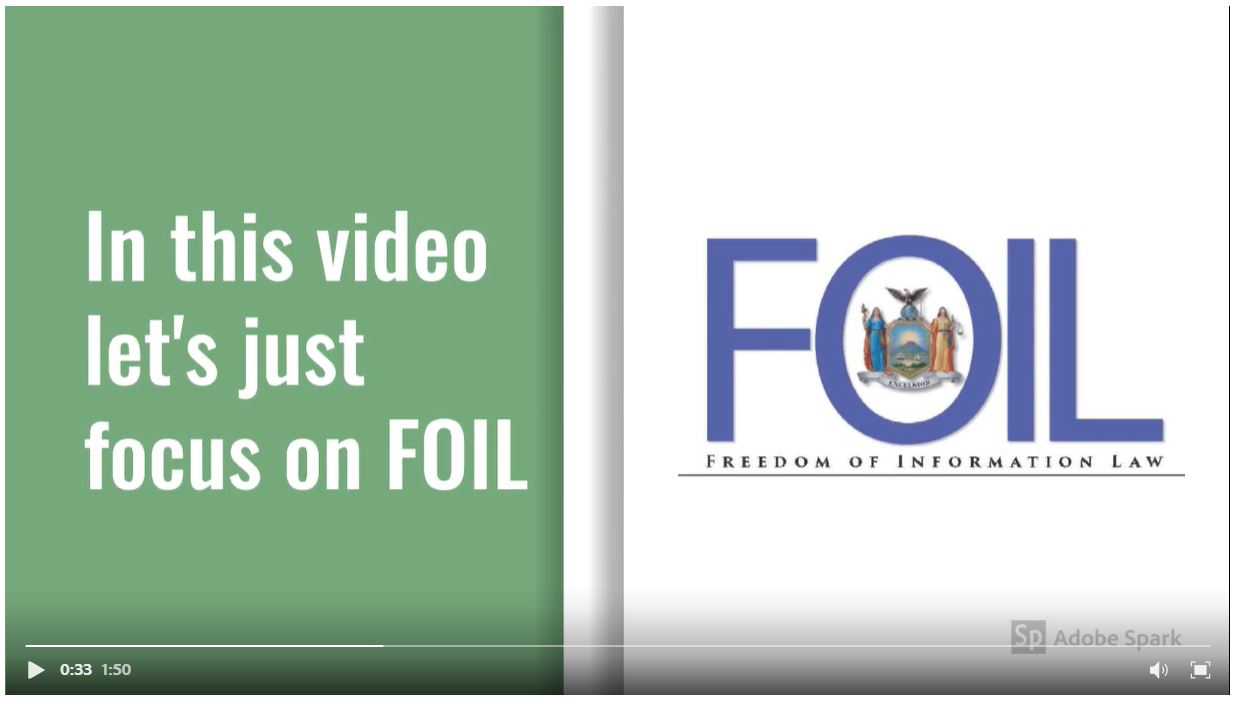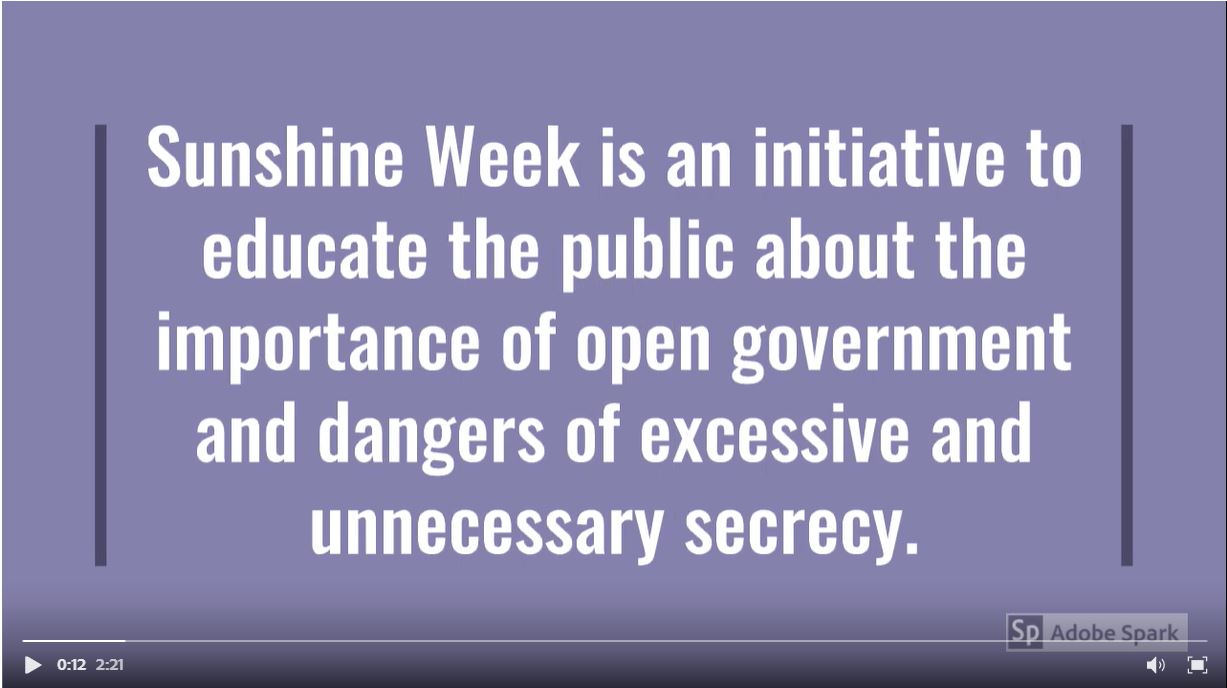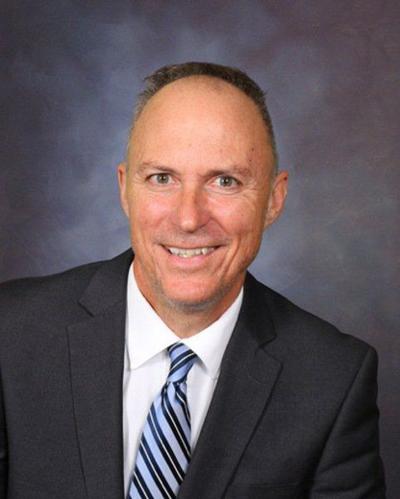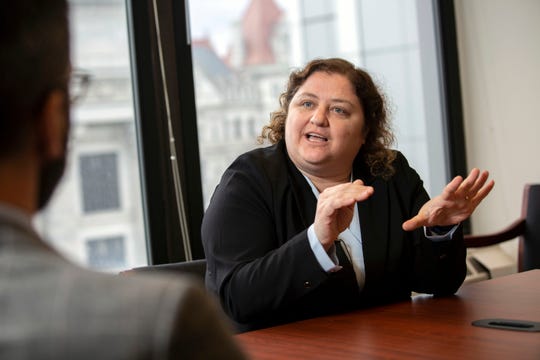|
New York News Publishers Association |
|||
Sunshine Week 2020 - March 15-21
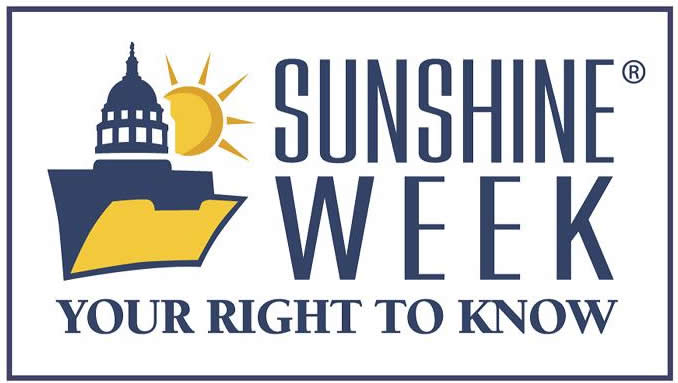
Sunshine Week is a national initiative to promote dialogue about the importance of open government and freedom of information. Participants include news media, civic groups, libraries, nonprofits, schools and all others interested in the public’s right to know. Sunshine Week seeks to enlighten and empower people to play an active role in their government at all levels, and to give them access to information that makes their lives better and their communities stronger.
Click here to access a set a teaching guide including graphic organizers highlighting Freedom of Information & Sunshine Week.
Click on the image below to view a short video providing a basic summary of New York state's Freedom of Information Law (FOIL).
Click on the next image to view a short video that highlights New York State's Open Meetings Law.
Below you'll find commentary and editorials about the importance of Freedom of Information. This content is available for all NYNPA member publications to reprint with attribution to increase public awareness of Sunshine Week and their right to know. Additional content will be added as it is received.
Shoshanah Bewlay, Executive Director, Department of State
|
The Role of Social Media in Open GovernmentSocial media and social networking websites and applications have been a mechanism for making connections and sharing information for over two decades now. In its early days, social media consisted primarily of websites like Friendster and Myspace for teenagers and young adults to share updates about their lives, and adults had Classmates.com for connecting with former high school friends and Linkedin to make career networking connections. Over the course of the past twenty years, however, social media has expanded significantly in both number of platforms and ubiquity of usage by persons of all ages. According to a February 4, 2019, article in the Wall Street Journal, Facebook now has over 2 billion users world-wide and as of February 2020, the Associated Press reported that Twitter had 152 million daily users in the previous quarter. The expansion of social media use has now, inevitably, made its way to the traditionally slow-to-adopt government sector. In recent years, government agencies at the federal, state, and local levels have adopted the use of social media as a quick and efficient way to connect with constituents. Perhaps not surprisingly as a result, the New York State Committee on Open Government (the Committee) has seen a marked increase in the number of questions concerning (i) the application of the Freedom of Information Law (FOIL) to social media posts by government agencies and (ii) the use of social media to notify the public of meetings of public bodies pursuant to the Open Meetings Law (OML). Addressing questions related to the rights of access to social media posts pursuant to FOIL, it must be noted that although social media technology is, when compared with our open government laws, relatively new, the information created within social media platforms is not different than any other government information. Indeed, as we know, FOIL governs access to all agency records and defines the term “record” very broadly as “any information kept, held, filed, produced or reproduced by, with or for an agency or the state legislature, in any physical form whatsoever…” Public Officers Law § 86(4). Accordingly, when a government agency uses any form of social media to provide information to the public, those social media posts constitute “records” subject to FOIL. The Committee recently issued an advisory opinion regarding a public official’s use of Twitter and the application of FOIL to those postings, confirming that social media content created using a government-sponsored account is a record subject to FOIL. Relatedly, while the retention and disposition of government records is outside of the Committee’s advisory jurisdiction, the New York State Archives, the agency responsible for oversight of New York government record retention and disposition schedules, has issued preliminary guidance specifically related to government records created using social media platforms. Addressing questions related to whether “public bodies” as defined by the OML may use social media platforms to make required notifications of their meetings, it must be noted that the OML does not directly answer this question, but rather imposes a three-fold notice requirement. Notice must: be posted in one or more conspicuous, public locations; must be given to the news media; and must be conspicuously posted on the website of the public body “when [it has] the ability to do so.” Public Officers Law § 104(6). While it is the opinion of the Committee that notice using social media does not satisfy the OML requirement to post such notice in a designated public location or on the public body’s website, the Committee encourages supplemental use of social media platforms to notify the public of open meetings and to share other important information. As younger citizens become adults, governments will be required to keep pace with social media platform trends to keep their constituents engaged and informed using methods such constituents prefer to use. |
Editorial Page Editor
|
Put teeth in state's open records lawsBill would give weak Committee on Open Government authority to enforce open meetings, FOIL violations Unlike states like Florida, California and Connecticut, New York is far from the most open when it comes to the release of government information to the public. To its credit, New York does have a very helpful state agency — the Committee on Open Government — which provides the media, regular citizens and government officials with effective guidance on the state’s Freedom of Information and Open Meetings laws. Yet even with all the information it provides and all the support and advisory opinions it has available, the Committee is essentially a toothless tiger. Any government agency that wants to deny access to records or meetings can flout the state’s transparency laws, leaving citizens with the limited and expensive option of taking them to court. A bill pending in state Senate (S1625) would put some muscle behind the Committee’s opinions by giving it the power to enforce the very state laws it was created to administer. The Integrity in Government Act, as it’s called, would expand the powers and duties of the Committee on Open Government, leveling the playing field between citizens who want to know what their governments are doing and the public officials who want to conduct the public’s business in secret. Under the bill, anyone denied the right to inspect or copy records or access a closed meeting could file an appeal with the Committee. The Committee could then serve notice on the offending government agency, review the allegations, investigate the citizen’s claims for access and if necessary hold a hearing. The Committee would be granted court-like powers, including power of subpoena, the ability to call witnesses and review evidence. After a final determination, the Committee could invalidate any action taken at any meeting to which a person was denied access and could require the offending government agency to produce or copy the sought-after record. It could also impose a civil financial penalty on the offending party, under the bill. The goal of this bill isn’t to create a new court case every time someone is denied access to a closed meeting or refused a record. It’s to serve notice on governments that citizens would now have a new tool to challenge illegal decisions beyond the costly option of going to court. That alone could compel governments to respond more positively to the public’s demand for access. What good is a state agency if it doesn’t have the power to enforce its own laws? This bill would give citizens greater power to fight secrecy in government. Lawmakers should grant them that power. |
CNHI Deputy National Editor and President of the Georgia First Amendment Foundation
|
It’s always your right to knowThe media is most definitely not your enemy. Far from being the enemy of the people, day in and day out we take our role as the Fourth Estate seriously and work hard to protect your right to know, making public records requests and attending public meetings to keep you informed. Why? Because we believe all the business government does, whether in open public meetings or behind closed doors, is your business. We believe every last penny government spends is your money. We believe it is your right to know every transaction, every decision, every expenditure and every deliberation of your government. Whether talking about the White House, the statehouse or the county courthouse, all the documents held in government halls belong to the people, and all the business conducted by our governors is public business. We believe our government — your government — can only be of, by and for the people when it is out in front of the people. Primary to our Republic is the understanding that we are the government and the government is us. The only powers held by federal, state or local government are the powers we give. So, whether it is Congress, the state’s General Assembly, county commission, city council or the board of education, it is your right to know all of the people’s business. When you attend local city, county or school board meetings, ask questions and hold elected representatives accountable, you are not minding their business, you are minding your own business. When you make a public records request, you are not asking local records custodians to give you something that just belongs to them or the office where they work. You are simply asking for your own documents. The Bill of Rights, specifically the First Amendment which guarantees the freedom of speech and the freedom of press, is not intended to protect the media per se. Rather, the founders built a hedge of protection around the media because the media guards and fights for the public’s right to know. According to a Brookings Institution report, more than 2,000 newspapers across the country ceased publication in the last 15 years or so. The shuttering of newspapers presents a very real and present danger to our most basic freedoms. That’s why communities should support their local newspapers, through subscriptions and advertising, now more than ever before. Journalists keep an eye on government, shine the light on its actions, fight the good fight for access to documents and meetings, champion transparency and defend the First Amendment because of a core belief in your basic, fundamental rights — principally, your right to know. |

|
Don’t hesitate to shine bright light on governmentToday begins what we in the newspaper business call Sunshine Week. It’s observed today through next Saturday. But it’s not OUR week. It’s yours. Well, it’s everyone’s. Sunshine Week is not just about newspapers and freedom of the press, but also includes broadcast and online news media, civics groups, nonprofits, schools and libraries. Essentially, it shines a light on access to public information and what that means for you and your community. Sunshine Week has been officially observed since 2005, but public access to government has been the linchpin of democracy since the Bill of Rights became part of the US Constitution in 1791. Holding government accountable is the foundation of our freedom. We do it every day. And so can you. In New York state, the Committee on Open Government is the go-to agency — part of the Department of State — that oversees and advises on the Freedom of Information Law, the Open Meetings Law and the Personal Privacy Protection Law. You can find out anything you want regarding open government by visiting https://www.dos.ny.gov/coog/. You may also make requests by writing: NYS Committee on Open Government, Department of State, One Commerce Plaza, 99 Washington Avenue, Suite 650, Albany, NY 12231 or by phoning 518-474-2518 or faxing 518-474-1927. Committee staffers will provide advice by telephone, email, written advisory opinions, and through training classes conducted statewide. Advice is offered to the government, the public and the news media. In the past, public bodies – especially newly elected officials — have been offered training by Committee on Open Government staffers. The Observer-Dispatch in the past also has hosted open government experts who have conducted public sessions locally to discuss and explain these laws. There are many moving parts here, but perhaps the most misunderstood — by elected officials and the public they serve — is the Open Meetings Law. In short, the law states that a quorum of the public body cannot meet and conduct public business behind closed doors. Executive sessions are grossly misunderstood. While an executive session is legal and is designed to keep certain discussion private, it cannot be used on a whim whenever elected leaders don’t want the public to hear what they have to say. Neither is an executive session a separate meeting held privately. An executive session is part of the regular meeting and must adhere to specific guidelines. A majority of the public group’s total membership must vote in open session to enter into executive session and identify the general subject to be discussed. Only very specific issues can be discussed here, all of which are clearly listed in the Open Meetings Law. (www.dos.ny.gov/coog/openmeetlaw.html) While the executive session is closed to the press and the public, the public group can authorize others to attend if they so choose. Sunshine Week also is a time to call attention to the Freedom of Information Law (FOIL). Basically, this law allows you to gain access to government records so you know how your government operates. It was originally passed in 1974, but revised several years later, becoming effective January 1, 1978. Right to gain access to records pertain to all state agencies - units of state and local government in New York state, including state agencies, public corporations and authorities, as well as “any other governmental entities performing a governmental function for the state or for one or more units of local government in the state.” The law states that all records are subject to the law, which defines “record” as “any information kept, held, filed, produced or reproduced by, with or for an agency... in any physical form whatsoever. . .” New York state even has a web site – launched in June 2018 – that makes it easier to access public records. The site - https://www.ny.gov/programs/open-foil-ny - will provide a uniform method to submit requests for government records. It provides access to record from more than 50 state agencies and public authorities. Another site, https://data.ny.gov/, lets you browse and download over 1,600 New York state data resources on topics ranging from farmers’ markets to solar photovoltaic projects to the latest state budget. Be aware of these laws and don’t be intimidated by government officials when seeking access, whether it’s open meetings or public records. Remember, you pay for government. That means you are entitled by law to public information, whether it be gained by attending your school board meeting or obtaining a copy of a recent city zoning decision. Don’t hesitate to use them. Use these web sites: Open government: https://www.dos.ny.gov/coog/ Open meetings law: www.dos.ny.gov/coog/openmeetlaw.html Freedom of information law (FOIL): https://www.ny.gov/programs/open-foil-ny State data: https://data.ny.gov/ |
Editorial Page Editor
|
If you want open government, you have to fight for itIf the recent coronavirus outbreak has taught us anything, it’s about how much the citizens benefit when government shares information and how much we lose when government withholds it or obfuscates it. Look how much better we’re being served by our own state government’s transparency and open communication in the face of the outbreak than we have been by a federal government that’s been scrambling to cover up its own inadequacies in addressing the problem. Information is not just power, it’s empowering. It allows us to make decisions and take action for ourselves, rather than leaving those decisions in the hands of government officials who might not always have our best interests at heart. When we have information, we know what questions we should be asking of government officials. With information, we know more where the failures are in the system and therefore can demand action on the matters that need to be addressed. We can’t benignly rely on the government to make itself transparent. Government often acts in its own self interests, protecting its actions and its officials from scrutiny, conflicting views and sometimes even prosecution. To ensure that government remains accessible to its citizens, it requires citizens to be active and vigilant on their own behalf. When we let down our guard, when we move on to other things, when we allow government to lock up information under the guise of privacy or some other rationalization, then we forfeit control over our own lives. We have to become educated about efforts to expand and contract our access to information and communicate with our elected officials to demand openness. As we’ve written on these pages recently, state lawmakers are considering legislation to give the state’s helpful but powerless Committee on Open Government new authority to enforce the state Open Meetings Law and Freedom of Information Law. The citizens need to demand that authority. Lawmakers are considering a bill ensuring the public access to public meetings during states of emergencies like the current coronavirus by giving government boards the authority to broadcast their meetings, with strict safeguards in place to prevent them from exploiting the opportunity of operating without an in-house audience. We need to support that. At the same time, government officials are also fighting against efforts to provide access to records and electronic data, such as dashboard and body cameras, that would shine the light on police misconduct. And state lawmakers continue to act secretly and without public discussion or debate when it comes to preparing the state budget, which affects all New Yorkers. Most recently, lawmakers waited until the middle of the night to pass hastily prepared legislation to vastly expand the powers of the governor in emergencies. The bill was passed within hours of it being distributed to lawmakers, and with little debate and no public input. Another element in your right to know is new waves of technology. Technology is a double-edged sword when it comes to government transparency. On one hand, the internet makes it much easier than it was in the past for government to share public records, to air its activities in public through telecasting of meetings, and to respond to requests for information. On the other hand, new technology allows government officials to more easily hide their actions, to communicate in secret and to conduct government business beyond the prying eyes of a vested public. The fight for transparency is never easy and never ending. Today (Sunday) marks the beginning of Sunshine Week, the time each year when the news media — which has long been on the front lines of the fight for open government — reminds citizens of their right to know and helps people understand the challenges and threats to open government. We hope through columns and editorials this week and throughout the year, this will give you, as citizens, the incentive, inspiration and information to act on your own behalf. If we want responsive and effective government, we all need to keep up the pressure on it to be open and accessible. |
from the Democrat & Chronicle, Rochester New York state editor for the USA TODAY Network
|
Q&A: New York’s new FOIL enforcement officer takes reins after scandal rocks officeShoshanah Bewlay read the news stories last year about the troubles at the state Committee on Open Government and the firing of its decades-long leader Robert Freeman over sexual-harassment complaints. But Bewlay, who has worked in state government since 2007, wanted the job. She applied, thinking she could be the one to turn around the tarnished reputation of a committee that has been long been lauded for its advocacy in seeking government transparency in New York. Bewlay was hired and now will look to build her own legacy much different than the one Freeman carved out as the public face of a small, but important Albany-based office in a massive state bureaucracy. Bewlay said she won't look to make the committee center around her. Freeman would speak off the cuff to reporters about how a Freedom of Information disagreement should be resolved, gave speeches across the country and built the office into a national model since starting there in the mid-1970s. That won't be Bewlay's style. "My philosophy of how to run an organization is that I’m not the only person who can and should be permitted to articulate an opinion on its behalf," she said in an interview with the USA TODAY Network New York. She spoke in advance of Sunshine Week, which started Sunday and has been a national campaign started by newspapers in 2005 to highlight governments' open records laws. Freeman built up sizable goodwill with the media in New York, which he allegedly used to sexually harass women reporters. He was abruptly fired in May when he was accused of groping a reporter last year and a police report was filed. No charges were brought. Soon after, at least eight women reporters spoke publicly to the USA TODAY Network New York about their uncomfortable dealings with him. Bewlay, 48, is a California native who came east to attend Vassar College in the Hudson Valley and later the University of Connecticut School of Law. When she took over in January, there were some early realizations that the power balance needed adjusting at the office, which is overseen by a five-member board and four ex-officio members, including Lt. Gov. Kathy Hochul. Bewlay said the board, which she reports to, had no bylaws and only met the required two times a year — a sign of Freeman's consolidated power. She is hoping for a more active board, and a larger staff. It is a three-person office that includes two attorneys. She hopes to add at least one more lawyer to the staff this year. "I don’t see my role as separate from the committee," she said, "but it is two-part: One it involves working with and facilitating the committee’s statutory obligations, and the second, of course, is to fulfill the very frequent requests that come in for guidance and help and advice." Here were some questions for Bewlay and her answers. They have been edited for clarity and space. What do you think you can do in the new role in this office? One of the things I think is an achievable goal would be to render the advice and guidance the committee has given over the past 40-plus years more accessible, legally and physically, to the public. As far as its website and its opinion database, it’s not incredibly user friendly. A lot of people have used it for a long time and find it very helpful, and they’re very used to it, and that’s great. But every year more people are coming into the workforce, and they need access to this material. The lion share of the material we have that is guidance to the public on how to access public documents is not available to the public, at least not openly or readily. What can you accomplish and how important do you see your role? The committee is very important. I am the most commonly seen and heard from person with the committee, but my personal role is to facilitate the mission of the committee, which is transparency. Right now, my day-to-day job is to apply the laws that exist today to the facts that are presented to me. And my role with respect to the committee is to report on troubling trends or issues that I’m seeing, and then we can develop together advocacy for making changes that may be necessary. Do you see yourself as a watchdog over the state and local governments when it comes to openness and transparency? Absolutely. That’s the role and the function of the staff of the committee. We are going to provide an opinion based on the information we are given, and if that opinion is there has been no compliance with open government laws, we are going to publicly state that. The challenge, of course, is that there’s no teeth in what I can say. I don’t have the ability to require anyone to do anything. I don’t have the ability to investigate anyone for alleged non-compliance with the statute. My role is persuasive, and I intend to be dispassionate and independent and objective enough so that I’m taken seriously when I make a call. You worked for Gov. Andrew Cuomo. Subsequent to your appointment, there were questions about your independence because you worked in different areas of state government. How do you respond to that? The skepticism is healthy. I respect it — people are entitled to prejudge if they feel like there is enough information to render a judgement. One of the challenges, of course, is that I have for a long time played a role that’s been a background role, that’s been support. I haven’t been out in front of audiences. I haven’t been out in front of citizens, so no one knows me. So, they make assumptions based on what they assume to be true. There’s obviously challenges with that approach. I hadn’t issued a single opinion or done anything one way or another, supportive or not supportive, of any particular media outlet at the time that some of this skepticism was aired publicly. It can be hard to tolerate, especially for someone who’s flown, to a certain extent career wise, below the radar for such a long time. But I am an attorney. I have obligations that are ethical obligations, not just ethical obligations under the public officer’s law. But there are also my obligations as an officer of the court. I will lose my license if I don’t operate with integrity. I am committed to operating with the appropriate level of independence and certainly with integrity. Let’s talk about your predecessor. What do you know about the allegations against him and how do you restore the trust in this office? I only know what you know about the allegations against him. I read them in the newspaper. So I have no first-hand knowledge about anything that happened. I think what needs to happen to restore confidence and trust is for me to do what I said I was going to do, which is respond objectively, appropriately, with consideration and with effort and an appropriate level of research and thoughtfulness into the inquiries that I get. It’s going to be very rare, at least in the first six months to a year, that I’m going to do this, that I’m going to be off the cuff about almost anything that is non-routine. What was your reaction to the allegations that came out in the newspapers? I was horrified. This is a public servant who had forged a reputation through what I now understand is lots and lots of personal relationships that he had kind of nurtured over the years. One thing that struck me was that it’s very dangerous to make yourself the story and to be a spokesperson in that way. My philosophy of how to run an organization is that I’m not the only person who can and should be permitted to articulate an opinion on its behalf. I’m in charge, I’m supposed to manage. I am the administrator of the function and operations of the staff of the committee, but you need to build that confidence with your team, however small. I don’t think that was the philosophy before. But it’s the philosophy now. Click the image below to view a video of a portion of this interview. |
Please note: Previous Sunshine Week content is still available for download and use.
Click here to access the eight newspaper in education features created for 2012 (3 column x 8 inches) - an overview of NYS FOIL, Open Meetings, How to gain access to records and one freature on Freedom of Information and NYS Courts.
Click here to access the five-part series of features highlights just a few of the websites with reports and other data that may be of interest to students and the general public. Graphic organizers to accompany these features are also available here as PDF download. The topics included:
• What is “E-Government”? – A brief summary of our “Cyber Sunshine” focus
• Vehicle Safety – Highway Safety Data
• Food Safety – Restaurant Inspection Reports
• School Safety – Violence and Disruptive Incident Report
Finally, click here to access five public service announcements in PDF format (2 columns x 6 inches) that can be use to promote Sunshine Week
If you'd like to make a donation to the NYNPA Newspaper In Education program, simply press the Donation button below.
Your generous gift will be processed through the New York Newspapers Foundation's secure PayPal account.
New York News Publishers Association, Inc.
Phone/Fax (518) 449-1667 - Toll-free: (800) 777-1667

